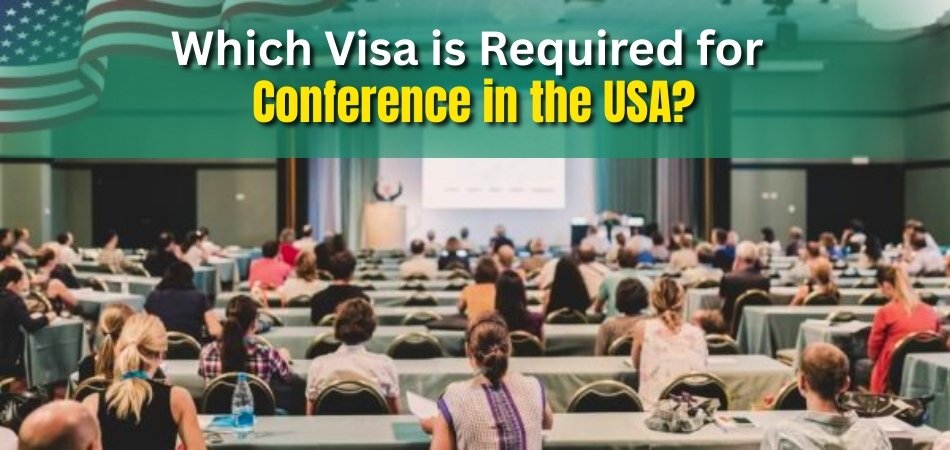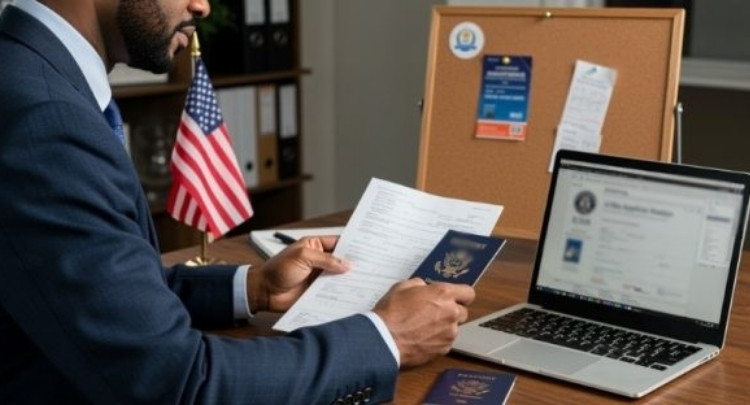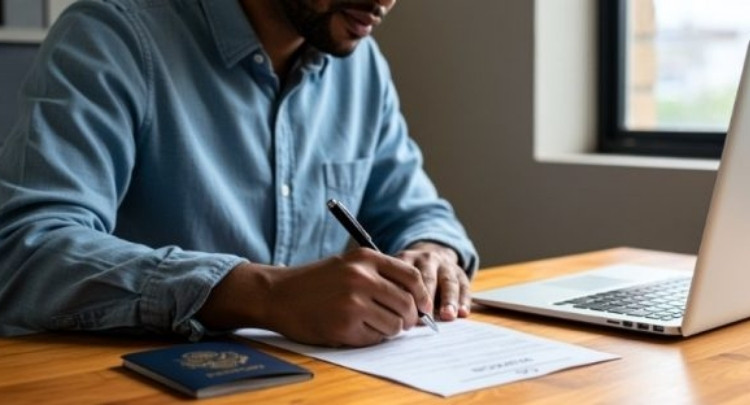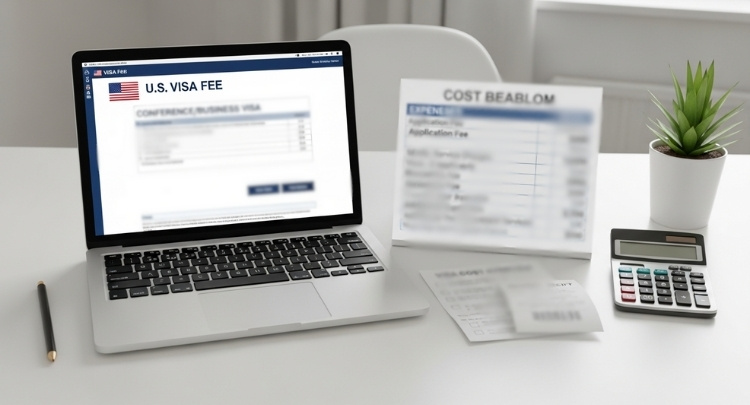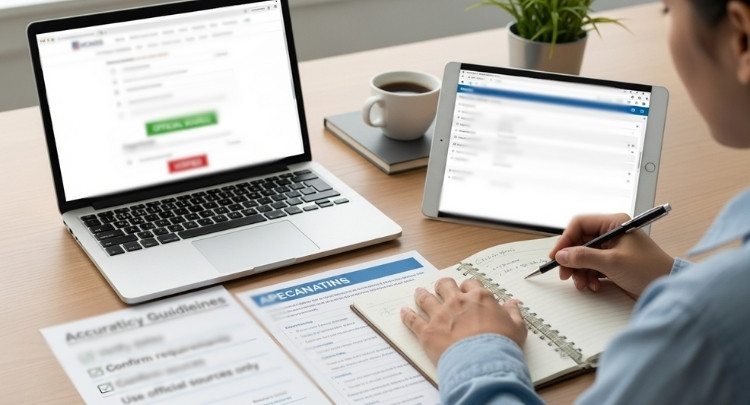Planning to attend a conference in the United States can feel exciting, but the visa part often creates confusion and stress. With different visa names, mixed advice online, and changing rules, many travelers are unsure where to start. If you are asking which visa is required for conference in the USA, you are not alone. This question matters because choosing the wrong visa can delay or even cancel your travel plans.
In most cases, professional conference attendees use a B1 or B1/B2 visitor visa, while some travelers may qualify to attend under ESTA depending on their nationality and purpose. The right option depends on what you will do at the conference. Keep reading to understand every detail clearly and choose the safest path for your trip.
What Type of US Visa Is Required for a Conference?
There is no single visa category created only for conferences. Instead, conference attendance in the United States is covered under existing visitor and exchange visa types. Choosing the right option depends on the nature of the event, your role at the conference, and whether you will take part in any professional activities. Understanding these visa types clearly helps avoid confusion during the application process or at the port of entry.
B1 Visitor Visa for Business Conferences
The B1 visitor visa is the most commonly used option for professional and business-related events and is widely accepted for many conferences in the USA that involve academic, corporate, or industry-focused participation without paid work.
This visa is usually appropriate if you are:
- Attending a professional, academic, or industry conference
- Presenting research or speaking without receiving payment
- Participating in meetings, panel discussions, or networking sessions
- Discussing future business, research, or academic collaboration
The B1 visa does not allow you to receive a salary or professional fees from a US organization. In some cases, limited reimbursements such as travel or accommodation support may be acceptable, which makes this option suitable for many international delegates.
B2 Visitor Visa for Non-Professional Conferences
The B2 visitor visa is mainly intended for tourism, leisure, and social visits. In limited situations, it may also be used for conferences that are not professional or business focused.
A B2 visa may be acceptable if:
- The conference is social, recreational, or informal in nature
- Your primary reason for travel is tourism and the conference is a minor part of the trip
- There is no professional, academic, or business activity involved
Using a B2 visa for a clearly professional conference can be risky, as visa officers may question your intent during the interview or upon arrival if the event appears business or academic in nature.
Combined B1/B2 Visitor Visa
Many travelers already hold a combined B1/B2 visitor visa, which is the most commonly issued US visitor visa and allows short visits that involve both business and tourism activities.
If you have a B1/B2 visa:
- You can usually attend a professional conference
- Your main activity must align with the visitor or business rules
- You must not accept paid employment or professional fees
US border officers focus on your actual activities rather than the visa label alone, so carrying clear documents that explain your conference purpose is strongly recommended.
ESTA and the Visa Waiver Program
Citizens of Visa Waiver Program countries may attend certain conferences using ESTA instead of applying for a visa, as long as all eligibility rules are followed.
ESTA may be suitable if:
- Your passport is from a Visa Waiver Program country
- The conference is short and business-related
- You will not receive payment or perform work
- Your stay does not exceed 90 days
ESTA is designed for short business visits, including conferences and professional events. Travelers who qualify for ESTA should normally use this option for conference travel. Choosing the entry method that matches your nationality, purpose, and length of stay helps reduce delays and supports smooth entry into the United States.
Why Do You Need a Visa to Attend a Conference in the USA?
Attending a conference in the United States is considered a temporary visit, but it is still regulated under US immigration law. Conferences often involve professional interaction, knowledge sharing, and formal participation, which can sometimes appear similar to employment activities. For this reason, US authorities carefully review conference-related travel to ensure visitors follow the correct entry rules.
Purpose Control for Foreign Visits
A visa helps the US government clearly understand why you are entering the country. When you apply, you must explain the exact purpose of your trip and show that attending the conference fits within the rules of a visitor or exchange visa category.
Confirmation of Temporary Stay
One key reason a visa is required is to confirm that your stay in the USA is short and limited. You must show that you plan to leave the country after the conference ends and that your visit does not turn into a long-term stay.
Proof of Strong Home Country Ties
Visa officers look for evidence that you will return home after the event. Employment, studies, family responsibilities, or ongoing commitments in your home country help prove that your travel is temporary and well planned.
Prevention of Unauthorized Work
A visa also allows authorities to ensure you will not take part in paid work or activities that are not permitted under visitor rules. Conferences may involve speaking or networking, but employment without authorization is strictly prohibited.
Even if a conference lasts only a few days, holding the correct visa is essential. The right immigration status protects you from entry problems, ensures compliance with US laws, and allows you to attend your conference with confidence and peace of mind.
What Documents Are Required for a US Conference Visa?
Preparing the documents is one of the most important steps for a successful US conference visa application. Missing or unclear paperwork often causes delays or refusals, so preparation matters. Review the required documents below, then continue reading for next steps.
- Valid Passport: A valid passport is required and should remain valid for at least six months beyond your planned stay, with enough blank pages for visa stamping and entry records during international travel.
- DS-160 Confirmation Page: Applicants must submit the DS-160 confirmation page, which proves the online visa application was completed correctly and includes a barcode used by the embassy to retrieve your personal and travel information.
- Visa Fee Payment Receipt: Proof of visa fee payment is required to schedule an interview, showing that the correct fee was paid and that your application can proceed to biometrics and consular review stage and processing.
- Conference Registration or Invitation: Conference registration confirmation or an official invitation helps demonstrate the purpose of travel, event dates, and your role, making it easier for officers to understand why your visit is temporary.
- Proof of Employment or Study: Proof of employment or study, such as employer letters or enrollment certificates, shows your current status and supports your intention to return home after attending the conference as planned abroad.
- Financial Proof: Financial documents like bank statements or sponsorship letters show you can cover travel, accommodation, and daily expenses, reducing concerns about overstaying or unauthorized work during your stay in the USA.
- Travel and Accommodation Details: Travel itineraries and accommodation details help officers see your planned arrival and departure dates, where you will stay, and how long you intend to remain in the country during the visit.
- Ties to Home Country and Supporting Letters: Ties to your home country, such as property, family, or long term employment, strengthen your case, and some embassies may also request a notarized invitation letter for added clarity during review.
Providing complete and well organized documents improves credibility and reduces delays. When each document clearly supports your travel purpose, visa officers can review your application with confidence and consistency.
Can I Attend a US Conference With My Existing B1/B2 Visa?
Many international travelers already hold a valid B1/B2 visitor visa and wonder if they need to apply again for a conference trip. In most cases, a properly used B1/B2 visa is sufficient for attending conferences, as long as your activities follow visitor and business rules.
Temporary Nature of the Visit
Your conference trip must be short and clearly temporary. Visa officers expect you to attend the event and return to your home country as planned, without extending your stay for unrelated or long term purposes.
Conference Must Fit Visitor or Business Rules
The conference should be professional, academic, or business related and must not involve paid work. Activities such as attending sessions, presenting without payment, or networking are usually acceptable under a B1/B2 visa.
No Paid Employment in the USA
You must not accept paid work, consulting roles, or financial compensation from a US organization. Receiving a salary or honorarium can violate visa conditions and may affect future visa applications.
Supporting Documents Are Important
Carry clear documents that explain your visit, especially if the conference is your main reason for travel. Conference invitations, registration confirmations, and return travel plans help officers understand your purpose quickly.
Using an existing B1/B2 visa can save time and effort if your travel plans align with visitor rules. Clear intent, proper documentation, and compliance with visa conditions help ensure smooth entry into the United States.
Can Students Attend Conferences in the USA?
Students from around the world often attend conferences in the United States to present research, learn from experts, and build academic connections. While this is generally allowed, the visa rules depend on whether the student is studying inside or outside the USA and the type of conference involved.
Students Studying Outside the USA
Students enrolled in institutions outside the United States usually apply for a B1, B1/B2, or in some cases a B2 visitor visa. The choice depends on whether the conference is academic or professional and whether the student will actively participate or only attend.
Students Already Studying in the USA
Students who are already in the USA on visas such as F1 or J1 must follow the rules of their current status. Some conferences may require approval from their school or program sponsor before participation or travel.
Presenting Research and Participation Rules
Students are generally allowed to present research or papers at conferences as long as they do not receive payment from a US source. Any form of employment or paid role is not permitted without proper authorization.
Attending conferences can be valuable for academic growth, but students must match their activities with the correct visa rules. Following institutional guidelines and visa conditions helps avoid complications during or after the conference visit.
Step-by-Step: How to Apply for a US Conference Visa?
Applying for a US conference visa becomes easier when you follow a clear sequence and prepare early. Each step builds your case and reduces delays. Use this guide carefully, then move forward to understand the application steps in detail below.
Step 1: Choose the Correct Visa Type
Start by identifying the visa that matches your conference purpose. Most professional events fall under B1 or B1/B2, while some travelers may qualify for ESTA. Your nationality, activities, and duration matter. Clear selection at this stage prevents confusion later, especially when finding international conferences that attract global participants.
Step 2: Complete the DS-160 Form
The DS-160 is the official US visa application form and must be filled out accurately. Enter personal details, travel history, and conference purpose truthfully. Any mismatch between your form and supporting documents may raise concerns during the interview or delay processing.
Step 3: Pay the Visa Fee
Once the DS-160 is submitted, you must pay the applicable visa fee based on your category. Keep the payment receipt safely, as it is required to schedule your interview. Fees are non-refundable, so confirm your visa type before payment.
Step 4: Schedule Biometrics and Interview
After payment, book your biometrics and visa interview at the nearest US embassy or consulate. In many cases, an in-person interview is now required, even for renewals. Appointment availability varies by location, so schedule early and allow enough time before your conference.
Step 5: Attend the Interview
During the interview, explain your conference purpose clearly and confidently. Be honest about your plans, length of stay, and activities. Provide documents when requested and answer questions calmly, focusing on your temporary visit and intention to return home.
Step 6: Track Your Passport
If your visa is approved, you will be informed about passport collection or delivery. Use the embassy tracking system to monitor its status. Processing times vary, so avoid making non-refundable travel bookings until your passport is returned.
Following each step carefully improves your chances of approval and reduces stress. A well-prepared application shows clarity, purpose, and compliance, helping you move forward confidently with your conference travel plans.
How Long Does It Take to Get a US Conference Visa?
The time required to obtain a US conference visa varies from applicant to applicant and depends on several practical and administrative factors. While some travelers receive decisions quickly, others may experience longer processing periods, making early planning an important part of conference travel preparation.
Embassy Workload and Location
Visa processing speed often depends on how busy the US embassy or consulate is in your country. High application volume, staffing levels, and local demand can affect how soon interviews are available and how quickly cases are reviewed.
Interview Wait Times
Interview wait times can vary significantly by location and season. In some countries, appointments are available within days, while in others they may take weeks. Checking official wait time tools helps you plan realistically.
Applicant Travel History
Your previous travel history, including past US visas and international travel records, can influence processing time. Applicants with clear and consistent travel histories often experience smoother and faster reviews than first-time travelers.
Security and Administrative Checks
Some applications require additional administrative or security checks after the interview. These reviews are routine but can extend processing time beyond the standard period, depending on the complexity of the case.
Because timelines vary widely, applying as early as possible is strongly recommended. Early preparation gives you flexibility, reduces stress, and increases the chance of receiving your visa in time for your conference.
How Much Does a US Conference Visa Cost?
The cost of a US conference visa depends mainly on the visa type you apply for. While government fees are fixed, applicants should also plan for a few additional expenses during preparation. Knowing the exact costs helps you budget properly and avoid last-minute confusion.
The cost of a US conference visa mainly depends on the visa type you apply for. While government fees are fixed, applicants should also plan for a few extra expenses during preparation. Knowing the full cost in advance helps you budget properly and avoid last-minute confusion.
B1 or B1/B2 Visitor Visa Fee
Applicants applying for a B1 or combined B1/B2 visitor visa must pay a standard non-immigrant visa application fee of 185 USD. This fee is required to schedule the visa interview and is non-refundable, even if the visa application is refused.
Visa Integrity Fee (From October 1, 2025)
Starting October 1, 2025, an additional Visa Integrity Fee of 250 USD is expected to be charged after the visa is approved and issued. This fee is paid only if the visa is granted and is added on top of the regular application fee. Applicants should include this amount when planning their total visa budget.
ESTA Fee for Visa Waiver Program Travelers
Travelers eligible for the Visa Waiver Program must pay an ESTA fee of 21 USD. This fee covers authorization processing and approval checks. ESTA is usually faster and cheaper than a visitor visa, but it allows a shorter stay and fewer options.
Additional Application Related Costs
Apart from visa fees, applicants may need to budget for extra costs such as document translation, courier services, passport photographs, travel to the embassy, or obtaining supporting documents. In rare cases, some applicants may also be asked to provide a refundable visa bond under a pilot program, depending on their profile.
Quick Cost Overview Chart
| Visa or Expense Type | Approximate Cost | Refundable |
| B1 or B1/B2 Visitor Visa (Application Fee) | 185 USD | No |
| Visa Integrity Fee (if visa is approved) | 250 USD | No |
| ESTA Authorization | 21 USD | No |
| Supporting Documents and Travel | Varies by applicant | No |
All US conference visa related fees are non refundable regardless of the decision outcome. Reviewing both fixed and variable costs early helps you prepare financially and complete the application process with confidence.
What Activities Are Allowed at US Conferences on Visitor Visas?
Understanding what activities are permitted during a conference visit is essential for staying compliant with US visa rules. Even small misunderstandings can lead to problems at the border or affect future visa applications, so knowing the limits helps you plan your participation correctly.
Activities You Can Usually Do
- Attend conference sessions, including talks, panel discussions, and workshops, as part of a temporary visit focused on learning, knowledge sharing, and professional exposure without engaging in employment or paid services.
- Present research, papers, or findings at a conference, as long as you are not paid by a US organization and your participation remains academic or professional in nature only.
- Network with professionals, researchers, and organizations to exchange ideas, explore future opportunities, and build connections that may lead to collaboration outside the United States later.
- Discuss potential business, research, or academic collaboration with individuals or organizations, provided no contracts, paid agreements, or active work arrangements are finalized during your stay.
Activities You Usually Cannot Do
- Accept paid work, consulting roles, or professional services from a US based organization, even if the payment is short-term or linked to conference participation.
- Receive a salary, honorarium, or financial compensation from a US source for speaking, presenting, or participating in conference activities beyond limited expense reimbursements.
- Work as conference staff, event organizer, or support personnel, since these roles are considered employment and require a separate work authorized visa category.
- Extend your stay in the USA for employment purposes or change your activities from conference attendance to paid work without proper authorization from immigration authorities.
Following these activity guidelines protects your immigration record and future travel plans. Staying within visitor visa limits ensures a smooth conference experience and avoids complications with future US visa applications.
Important Accuracy and Official Sources to Check Before You Apply
When preparing your visa application to attend a conference in the United States, it is important to understand that this guide explains general rules and not specific legal advice. Visa decisions depend on your nationality, personal history, and current policies set by the US government. Always confirm details with official sources rather than relying on unofficial sites.
Why You Should Verify Official Information
Seeking up-to-date information from US government sources helps you avoid errors, follow correct procedures, and respond accurately to changes in rules. This protects your travel plans and supports smoother processing.
Official US Government Sources to Review
Here are the most reliable sources to check before applying:
- US Department of State Visa Information: Visit the official US Department of State visa page to learn about all non-immigrant visas, application steps, and eligibility.
- Visa Waiver Program and ESTA Guidelines: For travelers eligible under the Visa Waiver Program, review the official guidance on ESTA requirements, eligibility, and travel limits.
- Visa Interview Wait Times and Scheduling Tools: Check current interview wait times and appointment availability for the US embassy or consulate where you plan to apply.
Using official government websites ensures that you are following the latest rules and procedures when applying for your conference visa. Consular practices and policies can change, so checking these sources before submission improves accuracy and confidence in your application.
Frequently Asked Questions
Many readers still have practical questions after understanding visa types, documents, and application steps. The answers below cover common concerns that are often missed but matter a lot when planning a smooth conference trip to the United States.
Can I Change My Travel Dates After Getting a Conference Visa?
Yes, you can change your travel dates after receiving your visa. The visa validity allows flexibility, but your stay duration is decided at entry. Always carry updated conference details and return plans to avoid confusion.
Do I Need Travel Insurance for a US Conference Visa?
Travel insurance is not mandatory for a US conference visa. However, it is strongly recommended due to high medical costs in the USA. Insurance also helps cover trip delays, cancellations, and emergencies during your stay.
Can I Visit Tourist Places Along With Attending a Conference?
Yes, limited tourism is usually allowed during a conference trip. As long as your main purpose remains conference attendance and your stay is temporary, short sightseeing activities are generally acceptable under visitor visa rules.
What Happens If My Conference Gets Canceled After Visa Approval?
If a conference is canceled after your visa is approved, your visa remains valid. You may still travel for tourism or another permitted purpose, but you should carry updated plans and ensure activities match visitor rules.
Can I Attend More Than One Conference on the Same Visa?
Yes, you can attend multiple conferences on one visa if all events fit visitor rules. Make sure your stay length is reasonable and all conferences are professional or academic without paid work involvement.
Will a Previous US Visa Refusal Affect My Conference Visa?
A past refusal does not automatically block approval. However, you must clearly explain changes in your situation. Honest answers, strong documents, and a clear conference purpose improve your chances significantly.
Is It Safe to Book Flights Before Visa Approval?
It is safer to wait until your visa is approved before booking non refundable flights. Some applicants make temporary reservations instead. This approach avoids financial loss if processing takes longer than expected.
Conclusion
So, which visa is required for conference in the USA? For most professional conferences, a B1 or B1/B2 visitor visa is the correct option. In some cases, B2 or ESTA may also work, depending on your purpose and nationality.
The key is matching your visa to your actual activities, preparing clear documents, and following official rules. With the right preparation, attending a US conference can be a smooth and rewarding experience.

